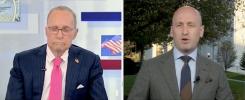מיללער קריטיקירט דעמאקראטן פאר "גרויזאמע" רעגירונג פארשליסונג איבער ACA פאנדינג.


White House Deputy Chief of Staff for Policy and Homeland Security Advisor Stephen Miller sharply criticized the 43-day government shutdown in November 2025, labeling it “cruel, capricious, dangerous, radical, and extreme.” Miller characterized the shutdown as a Democratic tactic aimed at securing $1.5 trillion in funding, including healthcare provisions for undocumented immigrants, which he said disrupted the nation and attempted to extort the Trump administration.
The shutdown, the longest in U.S. history, caused widespread disruptions, including flight delays, paused federal services, and unpaid federal workers. Republicans framed the closure as deliberate sabotage of the administration’s economic agenda, emphasizing its impact on small businesses, government operations, and taxpayer confidence.
Democrats, however, argued that the funding standoff was necessary to extend Affordable Care Act subsidies for millions of Americans. The standoff exposed divisions within the party, as eight Senate Democrats crossed party lines to vote with Republicans to end the shutdown, drawing criticism and backlash from their caucus.
Miller’s comments underscored the Trump administration’s position that the shutdown was not a legitimate negotiation tactic but an extreme political maneuver with tangible consequences for Americans. “It was worse than pointless — it was cruel, it was capricious, it was dangerous, it was radical, it was extreme,” Miller said, reinforcing the administration’s message that legislative overreach had threatened both government stability and the economy.
The shutdown concluded after bipartisan negotiations yielded a compromise funding measure, but the event left lingering questions about party strategy, the efficacy of legislative brinkmanship, and the political cost of extended federal interruptions. For the Trump administration, the episode became a focal point to highlight differences between Republican and Democratic approaches to fiscal responsibility, governance, and national priorities.
גאלערי
ווידעאס